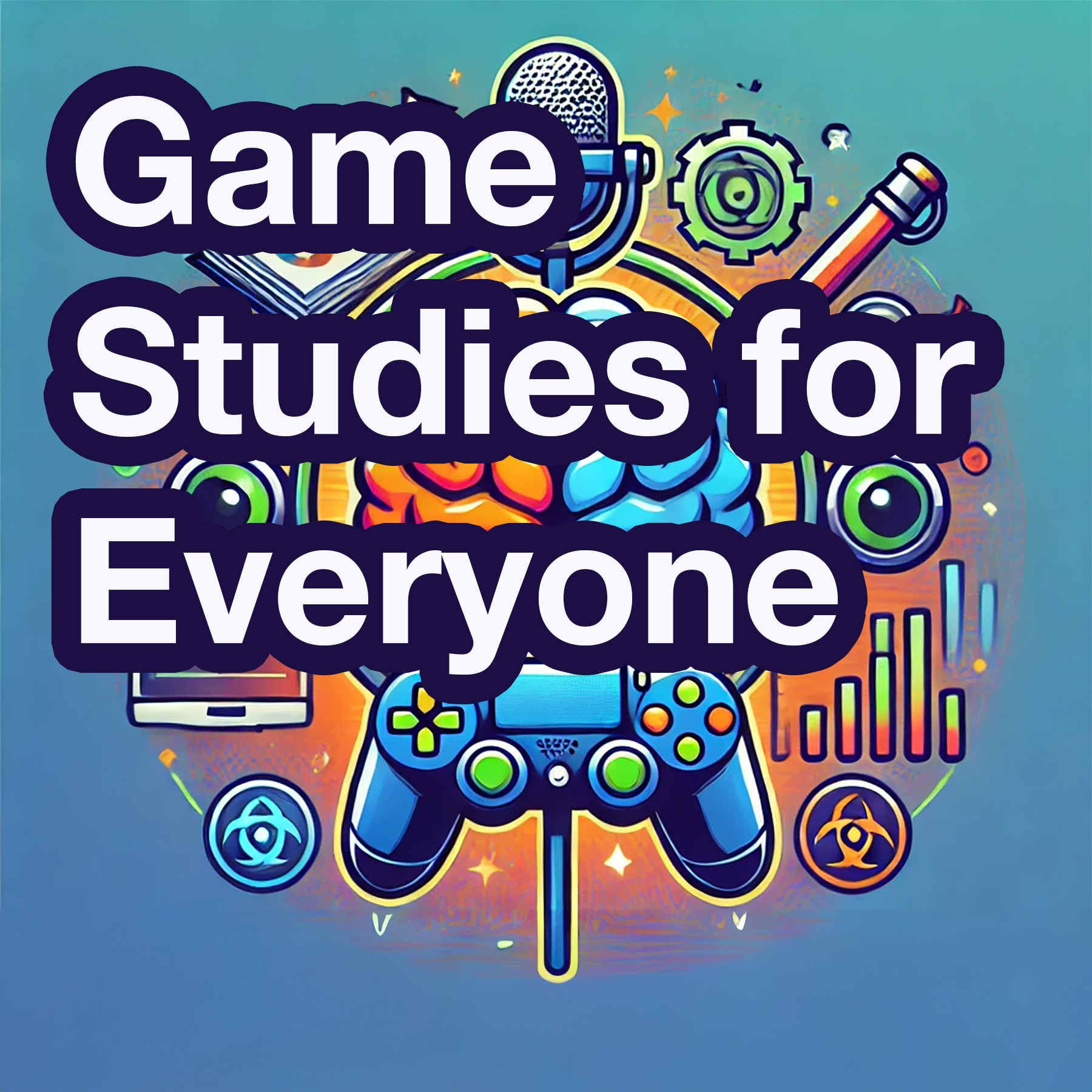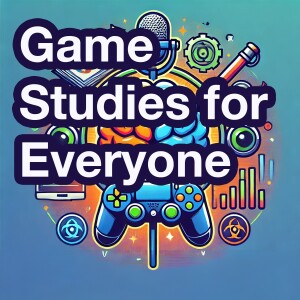
727
Downloads
40
Episodes
Welcome to Game Studies for Everyone, the podcast where complex game research becomes accessible to everyone! Join our co-hosts as they break down cutting-edge research in games and interactive media. Each 15 to 20 minute episode transforms academic findings into bite-sized, engaging discussions that everyone can enjoy. Whether you’re a gamer, developer, or just curious about the science behind the games you love, Game Studies for Everyone is your go-to source for easy-to-digest insights. No jargon, just fascinating research from peer-reviewed, published research in the humanities, computer science, narrative and more. Learn what’s new and how is shapes the way we play, learn, and develop. Hosted by Eliza Jiqiren and Nat Weizenbaum.
Episodes

Monday Oct 28, 2024
Game On: Curating Digital Art in the 21st Century
Monday Oct 28, 2024
Monday Oct 28, 2024
In this episode, we explore the challenges and opportunities of exhibiting interactive media in today's museums and galleries. Drawing from her extensive global experience organizing game art exhibitions, Grace breaks down the different approaches—exhibitions, festivals, and showcases—revealing the strengths and limitations of each. We dive into the complexities of displaying digital games, the importance of archiving, and the evolving roles of curators and judges in this exciting field. Whether you’re a game enthusiast, an art aficionado, or just curious about the future of digital media in art, this episode is your backstage pass to the thrilling intersection of gaming and art. Tune in to discover why recognizing the artistry and efforts behind game creation is more important than ever!
Sources:
Smithsonian American Art Museum’s Indie Arcade, Washington, DC, USA. http://www.IndiePopup.com (accessed April 2, 2017)
Smithsonian Institutes. Permanent Collections. http://americanart.si.edu/collections/mediaarts/ uri: http://edan.si.edu/saam/id/object/2013.70
Strong National Museum of Play, Rochester, New York, USA, http://www.museumofplay.org/
Grace, L. Heuristics from Curating and Exhibiting Game Art in the 21st Century, In proceedings of the 8th International Conference on Digital Arts (Artech 2017), Macao, China
Aesthetics of Gameplay. 2014. Digital Arts Community, http://gameartshow.siggraph.org/gas/ (accessed March 25, 2017)
Huhtamo, Erkki. "On the origins of the virtual museum." Museums in a Digital Age (2010): 121-135.

Monday Oct 28, 2024
Level Up: Blank Arcade 2015 – Exploring the Art of Games
Monday Oct 28, 2024
Monday Oct 28, 2024
Dive into the groundbreaking world of Blank Arcade 2015, a second event showcasing games as you’ve never seen before. In this episode, we uncover how this experimental exhibition transforms traditional game design into a powerful art form. From the physical challenge of 'Shapes,' a neurorehabilitation game that redefines physical therapy, to the digital odyssey of 'Arthur Rimbaud in Liberty City,' where the poetic world collides with the virtual streets of Grand Theft Auto IV to explore identity, these games push the boundaries of what games can be. We discuss concept-driven pieces that tackle pressing social, political, and environmental issues, revealing how game mechanics can engage players in complex conversations. This episode is your backstage pass to a revolutionary moment where games transcend entertainment and step into the realm of art—an exhibition you won’t want to miss!
Source:
https://www.lgrace.com/blankarcade/

Monday Oct 28, 2024
Games Beyond Play: Exploring the Art of Blank Arcade 2014
Monday Oct 28, 2024
Monday Oct 28, 2024
Dive into the world where gaming meets art in our latest episode! We explore the fascinating catalog of Blank Arcade 2014, an extraordinary showcase from the Digital Games Research Association (DiGRA) conference. This collection highlights early examples of games as artistic and conceptual expressions, pushing boundaries far beyond traditional play. From experimental narratives and innovative mechanics to visually stunning designs, these games redefine what it means to engage with interactive experiences. Join us as we navigate through the diverse range of titles and discuss how these playful creations challenge the norm and deserve a place in the exhibition halls of the art world. Perfect for game enthusiasts, artists, and anyone curious about the evolution of gaming as a form of artistic expression!
Grace, L 2014, Blank Arcade: An exhibition at the 2014 Digital Games Research Association Conference, exhibition catalogue, August 4, DiGRA Conference, Salt Lake City, Utah, USA. ISBN 978-1312375680 [PDF]
https://www.lgrace.com/blankarcade2014/

Tuesday Oct 29, 2024
Breaking the Mold: Enculturation and Creativity With Games and Creative Software
Tuesday Oct 29, 2024
Tuesday Oct 29, 2024
Are the cultural norms of the art world stifling true creative breakthroughs? In this thought-provoking episode, we dive into Lindsay Grace's exploration of enculturation and its impact on artistic production. Grace pulls back the curtain on the culture of art critique, academic consensus, and the processes that shape how creativity unfolds. She distinguishes between innovation, which refines and builds upon established ideas, and invention, the daring leap into the unknown. How does the art world’s preference for the familiar hinder radical, groundbreaking work? Tune in as we unpack Grace's argument that stepping beyond traditional methodologies is essential for invention—and the potential for an artistic revolution when we do. Get ready to challenge your perspective on creativity and discover what it really takes to break the mold!
Sources:
Manovich, L. (2002). The Language of New Media. Cambridge, Ma: M.I.T. Press.
Grace, L. 2009. The Challenge of Enculturation in the Arts, Handbook of Research on Computational Arts and Creative Informatics, IGI Global & Towson University (2009)
Bishop, A. (1991). Mathematical Enculturation: A Cultural Perspective on Mathematics. Melbourne, Australia: Kluwer Academic Publishers.
Grau, O. (Ed.). (2007). Media Art Histories. Cambridge, Ma.: M.I.T. Press.

Wednesday Oct 30, 2024
Play with Purpose: Unraveling the Art of Critical Gameplay Design
Wednesday Oct 30, 2024
Wednesday Oct 30, 2024
In this episode, we dive into the fascinating world of "critical gameplay design," an innovative form of game development that challenges the norms of traditional gaming. Discover how critical gameplay is more than just entertainment; it's a powerful platform for questioning societal values and sparking conversations about social and political issues. From its historical roots to the pedagogical and rhetorical impact of critical games, we unpack the transformative potential of this artistic practice. Get ready to rethink what games can be and how they shape our perceptions in this thought-provoking episode!
Source:
Dunne, Anthony, and F. Raby. De sign noir. Lon don: Birkhäuser, 2001.
Grace. L. 2010. Critical game play: soft ware studies in computer game play. 28th of the international conference on Human factors in computing systems (CHI EA '10). ACM, New York, NY, USA, 3025-3030.
Grace, L. 2011. Understanding the Art Practice of Critical Game play Designs, 17th International Symposium on Electronic Art (ISEA), Istanbul, Turkey

Friday Nov 01, 2024
Games as Art, in Scotlands Blank Arcade 2016
Friday Nov 01, 2024
Friday Nov 01, 2024
Step into the immersive world of digital games and interactive art with our latest episode, where we dive deep into Blank Arcade 2016, an early and pioneering exhibition that showcased games as art worthy of the gallery space. Join us as we explore the catalog's most captivating entries, guided by curators Lindsay Grace and Emilie Reed, who highlight the innovative, sensory experiences crafted by each creator. Discover how these groundbreaking games redefine play and art, pushing boundaries and inviting players to interact beyond the screen. Whether you’re a gamer, an art lover, or simply curious about the intersection of these worlds, this episode is a must-listen!
Source:
https://www.youtube.com/watch?v=ol-rIjQtqSg

Saturday Nov 02, 2024
Code & Creativity: Unveiling the Philosophy Behind Software Design
Saturday Nov 02, 2024
Saturday Nov 02, 2024
Ever wondered how the software you use shapes your creativity? In this episode, we unpack a thought-provoking study from the International Journal of the Humanities that dives into the philosophy behind software design. The author reveals how every design choice in software isn’t just functional—it’s philosophical, influencing how we create and interact. We explore a groundbreaking framework that blends critical design, postmodern philosophy, and creative process theory to analyze how software’s 'feedback loops' guide our interactions and even our thinking. But that’s not all—discover the intriguing concept of 'software misuse' and how it can expose the hidden intentions and constraints built into the programs we rely on. And finally, we introduce the idea of 'software viscosity'—the subtle resistance some software imposes that can either challenge or block your creative flow. If you're a designer, a creative, or just curious about the tech shaping our world, you won’t want to miss this deep dive into the intersection of design and philosophy!
Sources:
Lanier, J. (2003). One half a manifesto. In J. Brockman (Ed.), The new humanists: Science at the edge (pp. 233-262). New York, NY: Barnes and Noble.
Grace, L. 2009. The Philosophies of Software, Handbook of Research on Computational Arts and Creative Informatics, IGI Global & Towson University
Tufte, E (1993). The Cognitive Style of PowerPoint. New London, CT. Yale University Press
Chomsky, N (2006). Language and mind. New York, NY: Cambridge University Press.

Monday Nov 04, 2024
Breaking the Game: The Power of Critical Games in Challenging Conventions
Monday Nov 04, 2024
Monday Nov 04, 2024
What happens when games go beyond fun and entertainment to challenge societal norms and player expectations? In this episode, we dive into the growing field of "critical games," a transformative genre in the video game industry. These aren't your typical games; designed with a critical lens, they disrupt conventional gameplay to provoke thought and incite social commentary. We explore an insightful analysis that maps these games along two key axes: social critique vs. game mechanic critique, and continuous vs. discontinuous delivery of critique. This framework offers a fresh perspective on how critical games break boundaries, revealing that they are not examples of poor design but rather powerful tools for engagement and commentary. Tune in as we unravel how these innovative games offer new ways to understand gaming conventions and the societal issues they bring to light—transforming play into a form of activism!
Bashiri, K. (2008). You Have to Burn the Rope. [Web-Flash]. http://www.mazapan.se/games/burnTheRope.php played 22 March 2013
Cox, J. (2012). Don’t Kill the Cow. [Windows PC]. Seemingly Pointless. Oxford USA. played December 2012.
Grace, L. 2014. Critical Games: Critical Design in Independent Games. In Proceedings of the 7th Digital Games Research Association Conference (Digra 2014), Salt Lake City, Utah
Flanagan, M. (2009). Critical play: radical game design. MIT press.
Moynihan, D. (2010). One Chance. [Web-Flash]. Awkward Silence Games. England: played 12 February 2014
Pedercini, P. (2011). Phone Story. [Android], Molleindustria. Pittsburgh USA: played 2 March 2014

Game Studies for Everyone
Game Studies for Everyone, or GS-E, is the podcast series that brings cutting-edge research in games and game studies to everyone! We take peer-reviewed, academic studies and break them down into bite-sized, engaging episodes. Whether you're a gamer, student, or just curious, Game Minds makes complex research fun and accessible. Learn how games impact society, culture, and innovation—all in quick, digestible episodes designed for listeners on the go.
